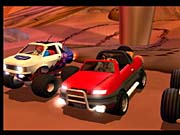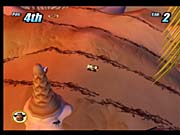As one of the longest-running car racing franchises around, the Micro Machines series certainly gained a bit of a following over the years. Based on the concept of miniature cars driving in wacky, oversized real-world environments, the first few games in the series featured a top-down camera view and a style of racing that was revolutionary for their time. Now, Infogrames has released Micro Machines for the PlayStation 2, and though it definitely sticks to the original formula, something has clearly been lost in the translation.

Micro Machines features four main gameplay modes. Its sole single-player mode is the race mode, which pits you against three of the game's eight selectable characters and features quick start, single race, time trial, and championship options. In the championship mode, you select your racer and the cup you wish to go after--bronze, silver, gold, or platinum. You go through a series of four races in each cup, unlocking the next level once you finish the fourth race. Many of the races are standard car races, though intermittent boat, dune-buggy, and rocket-car races add a little variety to the mix.
Each of the mode's cups is more difficult than its predecessor, starting at extremely easy and eventually graduating to frustratingly difficult. Much of the frustration is created by the courses themselves, which become jarringly hard to navigate thanks to the game's camera system. Most of the courses contain a number of extremely sharp turns, as well as a number of ramps and curves without rails to keep you from sliding off. Thanks to the overhead camera, it is impossible to see any of these turns or ramps coming, which essentially requires you to play the races over and over until you've managed to memorize them all. Additionally, the loose handling of the cars makes it extremely easy to drive off a cliff even when you know a turn is coming up, leaving little to no margin for error. What is even more frustrating is that in some of the game's multiplayer modes, a from-behind camera perspective is used. This works infinitely better, and yet this option is not available during the race mode. It's a bizarre design decision to say the least, and it really makes the race mode a lot less fun than it could have been.
All the game's other modes are designed around multiplayer functionality. Micro GP is a checkpoint race that is much longer than most of the game's other races. The Micro Machines mode requires you to score points by advancing as far ahead of the other racers as you can. Bomb tag is exactly what it sounds like--one of the four racers begins with a bomb attached to his or her car, and the goal is to tag another car with it. A timer counts down all the while, until the bomb eventually explodes. The last racer standing wins the match. Though the game's multiplayer component is clearly its featured attraction, it is unfortunately hindered by a significant drop in frame rate whenever additional players plug in. It is so bad, in fact, that the game almost seems to run at half speed, which effectively ruins whatever fun might have been had.

If it weren't for the frame rate and camera issues, Micro Machines would be a pretty good-looking game. Granted, the cars are very small and almost indistinguishable during gameplay, but the game's eight different environments are all very large, and they all have multiple track options. Also, many of the interactive elements associated with the levels, such as the water in the boat racing levels and the various rats and cockroaches that roam about in the urban level, are pretty well done. The game's sound is fairly decent as well. It contains all the cartoon-inspired effects you'd expect from a game of this type, as well as some decent dialogue from the racers and a good but slightly uninspired soundtrack.
Unfortunately, the game's solid level design and passable audio quality just aren't enough to make up for its numerous problems. If nothing else, Micro Machines serves as an excellent example of why nostalgia can only take a game so far. Without quality gameplay and a solid presentation, the nostalgic aspects lose their impact, and you end up with a mediocre title that will disappoint the fans of the classic games. If you're a fan of the original Micro Machines games, do yourself a favor--bust out an older version of the game and leave Micro Machines for the PS2 alone. In the long run, you'll be a whole lot happier.